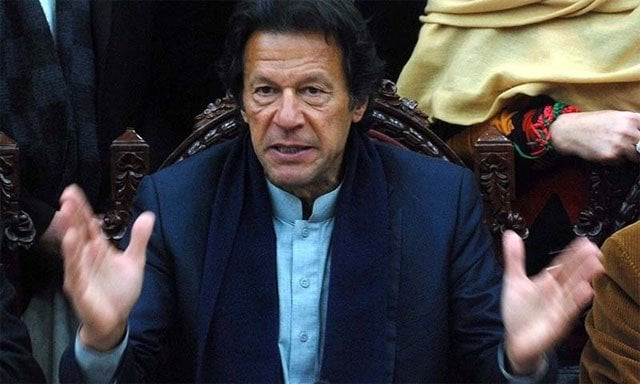SSP torture case: ATC verdict on Imran's acquittal plea on 23rd
PTI counsel says witnesses didn't nominate PTI chief

Imran states many cases were 'forcibly suppressed by special departmental committee despite objections from audit' PHOTO: PPI
ATC Judge Shahrukh Arjumand reserved the verdict on the application filed under section 265-K of the Criminal Procedure Code (CrPC) after hearing arguments from PTI chief's counsel Dr Babar Awan and Special Public Prosecutor Chaudhry Shafqaat.
On a lighter note, Awan told the court, "His [the PTI chief's] name is Khan and he is not a terrorist."
He said Khan was not nominated by the witnesses, who said a mob beat up Junejo, a senior superintendent of police (SSP) then, and others.
After going through statements of the witnesses, Awan said, he felt the need to cross-examine them as they had not nominated Khan in the testimonies. "Does that mean the case is concluded," enquired the judge.
Awan replied that conclusion would be a different proposition and then drew the court's attention towards section 265-K of CrPC. He argued that a charge of terrorism was being applied to shoe-hurlers and the leader of one of the largest political parties.
The prosecution did not either say they wanted to reexamine the accused or any of the witnesses, he said, adding that the witnesses did not name Khan and simply said a mob attacked the then SSP.
He said if all the witnesses – who had already recorded statements in absence of the accused [Imran Khan] who was declared a proclaimed offender over his failure to appear before the court for over three years – made the same statement on being called again in presence of the accused, there would be no need to cross-examine them.
Awan said witnesses were men in uniform and they could not say now that they were under the same influence or made statement under coercion. "The defence counsel's job is to create dent in the case and in the instant case there are so many dents that it looks like an accident," he added.
He said the PTI chairman's proverbial provocation did not attract terrorism or death penalty. "I rely on the testimonies of the witnesses for acquittal as there is nothing against him [Khan]," he said.
When the judge enquired if the evidence which earlier led to declaring Khan a proclaimed offender could be used for his acquittal, Awan replied in affirmative, adding that the court had already released Khan on bail when he finally appeared before the court.
In his arguments, Shafqaat, the special public prosecutor, cited Section 21-L (punishment for an absconder) of the Anti Terrorism Act (ATA) that states that "whenever being accused of an offence under this Act, [someone] absconds and avoids arrest or evades appearance before any inquiry, investigation or court proceeding or conceals himself, and obstructs the course of justice, shall be liable to imprisonment for a term of not less than six months and not more than five years or with fine or with both."
ATC grants bail to PTI leaders in PTV, Parliament case
He said witnesses would be called again to testify and section 21-L would be added to the charge-sheet "which is incomplete at the moment". He added that more witnesses would be called in to record statements against the accused.
The prosecutor requested the court to give prosecution full opportunity to establish its case as everything happened during the 2014 sit-in when section 144 of CrPC was imposed. "Application under section 265-K is premature at this stage. Everyone's role will be determined when the trial is concluded," he said.
Later, the judge reserved the verdict, saying it would be announced on April 23.
Earlier, the court confirmed Khan's pre-arrest bail in cases pertaining to the attack on Junejo and the PTV and parliament buildings as well as a violation of the loudspeaker act during the 2014 sit-in.
Political leaders and over a hundred workers and supporters of the PTI and the Pakistan Awami Tehreek (PAT) were booked in the cases. The workers, who were arrested, were later released on bail.
On August 31, 2014, in an attempt to topple the PML-N government, the PTI and the PAT workers had marched on parliament and the PM House while clashing with policemen along the way.
On September 1, 2014, hundreds of men, allegedly protesters from the PTI and PAT camps, ransacked the PTV office, parliament premises and brutally beat up Junejo, less than 24 hours into his first day of job as SSP operations.
Khan, PAT chief Tahirul Qadri and several others were booked for their alleged involvement in the attacks.



















COMMENTS
Comments are moderated and generally will be posted if they are on-topic and not abusive.
For more information, please see our Comments FAQ